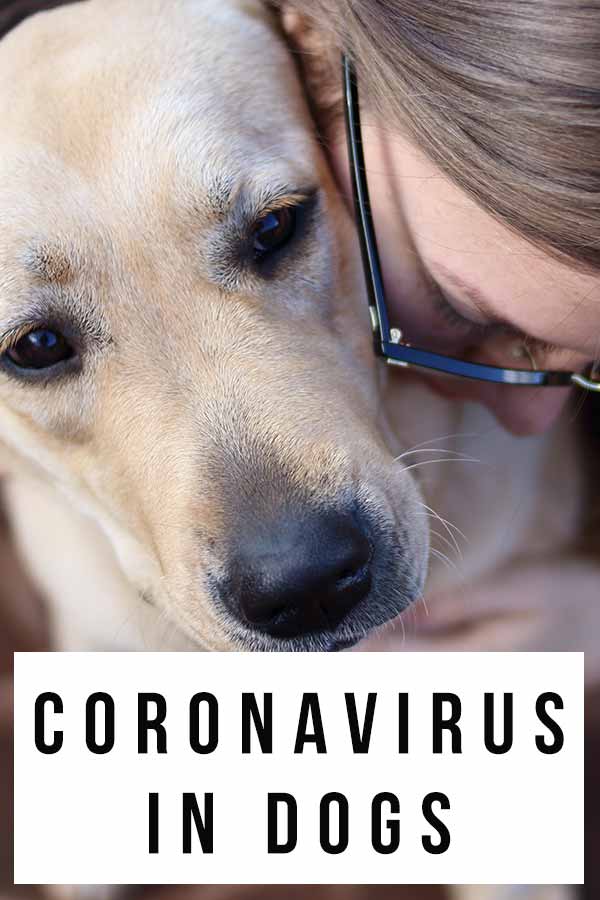Coronavirus in dogs usually takes the form of a mild bout of gastroenteritis.
However, at the time of writing, a global outbreak of respiratory coronavirus in people is also causing a great deal of fear and worry.
These two types of coronavirus are different and separate.
This article is all about:
- the distinction between coronavirus in dogs and humans
- the risk of pet dogs being infected by COVID-19
- and the precautions recommended for dog owners by vets and infection control experts.
Our aim is not to alarm you, but to reduce some of the worry and stress caused by uncertainty and make sure you have access to up to date information.
Coronavirus In Dogs
Many dog owners are already familiar with the term coronavirus.
There are two types of canine coronavirus, which have been known for a long time.
Canine Enteric Coronavirus
The first, canine enteric coronavirus (sometimes abbreviated to CCoV) has been recognized in dogs since the 1970s.
It can refer to one of two strains of virus, both of which affect the stomach and intestines and cause inflammation.
Canine enteric coronavirus symptoms in dogs include loss of appetite, vomiting and diarrhea.
They’re usually mild and pass of their own accord with a little time and TLC.
Canine Respiratory Coronavirus
Canine respiratory coronavirus (abbreviated to CRCoV) was discovered more recently.
It affects dogs’ respiratory systems – their windpipes and lungs.
Respiratory coronavirus symptoms in dogs include a dry cough and runny nose.
Canine respiratory coronavirus is one cause of canine infectious respiratory disease (CIRD) – more commonly known as ‘kennel cough’.
But it’s not the only one. Kennel cough is most usually caused by a strain of bacteria called Bordetella bronchiseptica.
Human Coronaviruses
In people, a small number of coronaviruses are responsible for coughs, colds and pneumonia.
In fact they’re rather common – strains of coronavirus which constantly circulate at a low level in human populations are thought to be behind 15-30% of respiratory tract infections.
Unfortunately, at the beginning of 2020, we’re currently experiencing the impact of a new, exceptional strain.
COVID-19
In late 2019, a new strain of coronavirus was reported in the city of Wuhan, China.
The virus itself has been formally designated SARS-CoV-2, and the illness it causes has been named COVID-19 (COrona Virus Disease – 2019).
At the time of writing, cases of COVID-19 have been reported in 80 different countries, and are responsible for over 3,000 deaths.
Around the world, governments and infectious disease experts are trying to control the spread of the SARS-CoV-2 virus, and bring the COVID-19 outbreak under control.
As well as concern for themselves and their loved ones, a lot of dog owners are also worried about any risk to their pets.
Can dogs catch coronavirus COVID-19?
And if they can, can humans get coronavirus from dogs?
Can Dogs Catch Coronavirus COVID-19?
At the time of writing, there is very little known risk of COVID-19 to dogs.
For the most part, SARS-CoV-2 virus, like all coronaviruses, is highly species-specific.
Their life cycle depends upon tricking the cells of a host’s body into absorbing them, so they can take control once inside.
To do this, they carry proteins on their outer surface which match proteins on the cell walls of their host.
Since cell wall proteins are different in every species, viruses can usually only trick one kind of host into absorbing them.
In fact, for a long time it was thought that coronaviruses couldn’t leap between species at all.
But unfortunately, we now know that genetic variability within a single viral strain can sometimes make it possible for them to infect more than one species.
This is what scientists believe has happened now. A virus very much like SARS-CoV-2 virus was originally thought to have been restricted to bats, but a subtle variation of it is now able to infect humans (and possibly some unconfirmed intermediary species).
The Risk Of Coronavirus To Dogs
So our pet dogs should be safe, but in the last couple of days there has been cause for concern.
On 26th February, officials in Hong Kong reported that a pet dog of a confirmed coronavirus patient had also tested weakly positive for coronavirus.
At the time, it wasn’t clear whether the dog was truly infected, or contaminated by viral debris from their owner.
But since then, the dog has tested weakly positive again on 28th February and 4th March.
This suggests the dog has also contracted COVID-19.
However, it doesn’t mean:
- That all dogs can catch COVID-19.
- That infected dogs will get sick. It is possible to be infected with a virus and not experience any symptoms, and at the moment the infected dog is still well.
- Or that infected dogs will make other dogs or people sick.
Let’s unpack that last point in a little more detail.
Can Humans Get Coronavirus From Dogs?
The new coronavirus outbreak is very much a developing situation.
There are still a lot of unanswered questions about what conditions it requires for transmission from one host to another.
And infected doesn’t necessarily mean infectious.
Viruses are infectious when their host sheds them back into the environment.
It’s possible that dogs can be weakly infected with COVID-19, but not infected enough to shed the virus back into the environment.
The Center for Disease Control and Prevention, the World Small Animal Veterinary Association, the World Organisation for Animal Health, and the Hong Kong agencies overseeing the quarantine of the low-level infected dog all agree that the primary way people catch COVID-19 is from other people.
None currently believe that pet animals are responsible for passing the infection back to people.
Risk Of COVID-19 In Dogs – Sensible Precautions
Whilst there isn’t currently known to be any risk of dogs transmitting coronavirus to people, it is still recommended that we:
- Wash our hands before and after being around or handling all animals, their food, or supplies.
- Avoid kissing animals, or let animals kiss us.
- Maintain a clean and hygienic household environment.
- Ask another member of the household to look after pets if we are sick.
However, it’s very important to remember that these are all things we should be doing under normal conditions too!
Coronavirus In Dogs Vaccine
A vaccine against the two strains of canine enteric coronavirus is available.
It is sometimes offered by vets in addition to the standard schedule of puppy shots. And it is also available in a combined shot with the vaccines for other common preventable illnesses.
If your dog has been offered or received the combined DAPPC vaccine, the ‘C’ stands for enteric coronavirus.
However, the canine coronavirus vaccine isn’t considered part of the core vaccination requirement for dogs, and there is some disagreement about whether it’s worthwhile at all.
The World Small Animal Veterinary Association does not recommend routinely vaccinating dogs against canine coronavirus, due to insufficient evidence that the vaccine works.
They also point out that canine enteric coronavirus is a relatively mild illness, and not cause for concern enough to warrant vaccinating against.
What About A Vaccine Against Respiratory Coronavirus In Dogs?
There isn’t a vaccine against canine respiratory coronavirus.
Kennel cough vaccines offer protection against some of the other diseases described as kennel cough (notably Bordetella), but not canine respiratory coronavirus.
Nor does the vaccine against canine enteric coronavirus work against canine respiratory coronavirus.
Coronavirus In Dogs – Summary
Most coronaviruses only cause mild symptoms in healthy hosts.
Dogs have been affected by canine strains of gastroenteric coronavirus and respiratory coronavirus for decades.
In 2020, a novel strain of coronavirus is affecting people all over the world.
At the time of writing, only one pet dog is thought to have contracted a very weak case of COVID-19 infection, and there’s no evidence that dogs can transmit the infection back to humans.
During the 2020 coronavirus outbreak, we can all help to restrict the spread of disease by maintaining strict hygiene practices.
And here at The Labrador Site HQ, we hope that all of our readers and your dogs stay well.
For Up To Date Information About Coronavirus In Dogs
The 2020 coronavirus outbreak is a rapidly evolving situation.
These websites are providing regularly updated information about the outbreak:
- The World Small Animal Veterinary Association and the World Organisation for Animal Health are both publishing regular updates on how the COVID-19 outbreak relates to our pets.
- The Center for Disease Control and Prevention has a page of questions and answers on all aspects of the outbreak, including a section on COVID-19 and animals.
- The Worms and Germs blog written by veterinarian and infectious disease specialist Professor Scott Weese, and published by the University of Guelph, has been posting regular update on the outbreak, as it relates to our pets.
And we will of course be back with our own update, when we have more information.
References and Resources
Lorusso et al, Novel coronavirus (SARS‑CoV‑2) epidemic: a veterinary perspective, Veterinaria Italia, 2020.
Paules et al, Coronavirus Infections—More Than Just the Common Cold, Journal of the American Medical Association, 2020.
World Small Animal Veterinary Association, Vaccination Guidelines, 2015.
Regan & Sykes, Canine Infectious Respiratory Disease, Veterinary Clinics of North America Small Animal Practice, 2019.
Appel, 40 Years of Canine Vaccination, Advances in Veterinary Medicine, 1999.
Pratelli, Genetic diversity of a canine coronavirus detected in pups with diarrhoea in Italy, Journal of Virological Methods, 2003.
Fehr & Perlman, Coronaviruses: An Overview of Their Replication and Pathogenesis, Methods in Molecular Biology, 2015.
Erles & Brownlie, Canine respiratory coronavirus: an emerging pathogen in the canine infectious respiratory disease complex, Veterinary Clinics of North America – Small Animal Practice, 2008.
The Government of the Hong Kong Special Administrative Region, Low-level of infection with COVID-19 in Pet Dog, 2020.
The Labrador Site Founder
Pippa Mattinson is the best selling author of The Happy Puppy Handbook, the Labrador Handbook, Choosing The Perfect Puppy, and Total Recall.
She is also the founder of the Gundog Trust and the Dogsnet Online Training Program
Pippa's online training courses were launched in 2019 and you can find the latest course dates on the Dogsnet website




















